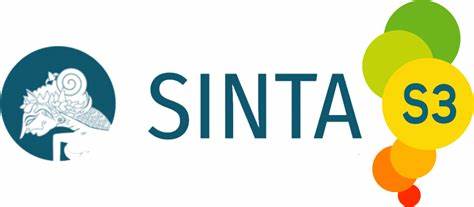ENHANCING EFL STUDENTS' ORAL SKILLS THROUGH A GENRE-BASED APPROACH: A CASE STUDY
Abstract
This study investigates how the Genre-Based Approach (GBA) enhances secondary EFL students’ oral proficiency by addressing four specific objectives: (1) to examine the role of lesson planning and scaffolding in oral skill development, (2) to analyze how the stages of GBA support speaking instruction, (3) to investigate students’ improvement in micro and macro oral skills, and (4) to explore students’ responses and engagement during oral activities. Conducted in a private secondary school in Bandung, the study involved five 8th-grade students. This qualitative research employed classroom observations, student interviews, and recorded student videos, with the data analyzed thematically. The findings reveal that well-planned lessons provided effective scaffolding for students’ gradual independence. Furthermore, the implementation of GBA stages facilitated structured oral practice that improved confidence and accuracy. In addition, students showed progress in both micro and macro skills. Finally, interactive tasks and peer feedback fostered engagement, reduced anxiety, and built confidence in oral communication. These findings highlight the potential of GBA as an effective teaching approach for improving students’ oral skills and provide useful insights for teachers looking to implement more structured and interactive speaking activities in the classroom.
References
Ahyarudin, D. A., & Jamilah, J. (2024). Enhancing students’ speaking skills: The impact of
AI‐based instructional tasks in the genre‐based approach. Formosa Journal of
Sustainable Research, 3(9), 2019–2032. https://doi.org/10.55927/fjsr.v3i9.11506
Arta, B. (2018). Multiple Studies: The Influence of Collaborative Learning Approach on
Indonesian Secondary High School Students' English-Speaking Skill. English
Language Teaching Educational Journal, 1(3), 149-160.
https://doi.org/10.12928/eltej.v1i3.143
Bakhsh, S. A. (2016). Using games as a tool in teaching vocabulary to young learners.
English Language Teaching, 9(7), 120–128.
Brown, H. D. (2004). Language assessment: Principles and classroom practices. Pearson
PTR Interactive.
Candraloka, O. R., & Rosdiana, A. (2019). Investigating problems and difficulties of
speaking that encounter English language speaking students of junior high school. JELE (Journal of English Language and Education, 5(2), 130–135. https://doi.org/10.26486/jele.v5i2.968
Creswell, J. W., & Poth, C. N. (2018). Qualitative inquiry and research design: Choosing
among five approaches (4th ed.). SAGE Publications, Incorporated.
Damayanti, I. L. (2017). From storytelling to story writing: The implementation of reading
to learn (R2L) pedagogy to teach English as a foreign language in
Indonesia. Indonesian Journal of Applied Linguistics, 6(2), 232-245.
Derewianka, B., & Jones, P. (2016). Teaching language in context. Oxford University Press.
198 Madison Avenue, New York, NY 10016.
Gong, Q., Kawasaki, K., Yeung, W. L., Zhang, G., & Dobinson, T. (2018). Students’
perceptions of the use of video recording in additional language oral assessments.
In Literacy unbound: Multiliterate, multilingual, multimodal (pp. 133-152). Cham:
Springer International Publishing. http://dx.doi.org/10.1007/978-3-030-01255-7_8
Halliday, M., & Matthiessen, C. (2014). An introduction to functional grammar (4th ed.).
Routledge.
Hammond, J., Burns, A., Joyce, H., Brosnan, D., & Gerot, L. (1992). English for social
purposes: A handbook for teachers of adult literacy. Sydney: National Centre for English Language Teaching and Research, Macquarie University.
Hinkel, E. (2018). Teaching academic ESL writing: Practical strategies for EAP students.
Routledge.
Hyland, K. (2007). Genre pedagogy: Language, literacy and L2 writing instruction. Journal
of Second Language Writing, 16(3), 148–164.
https://doi.org/10.1016/j.jslw.2007.07.005
Jenkins, J. (2015). Repositioning English and multilingualism in English as a lingua
franca. Englishes in Practice, 2(3), 49-85. DOI 10.1515/eip-2015-0003
Kvale, S., & Brinkmann, S. (2014). Interviews: Learning the craft of qualitative research
interviewing (3rd ed.). SAGE Publications.
Krashen, S. (1982). Principles and practice in second language acquisition. Pergamon
Press.
Laila, M., Muzammil, L., & Diftu, S. W. A. (2023). Challenges and strategies in teaching
English speaking skills to young learners: Perspectives of teachers in Indonesia.
Journal of English Language Teaching and Linguistics, 8(1), 1–15.
Martin, J. R. (2009). Genre and language learning: A social semiotic perspective. Linguistics
and Education, 20, 10–21.
Martin, J. R., & Rose, D. (2008). Genre relations: Mapping culture. Equinox.
Morrow, L. M., Roskos, K. A., & Gambrell, L. B. (2015). Oral language and comprehension
in preschool: Teaching the essentials. Guilford Publications.
Oflaz, A. (2019). The effects of anxiety, shyness and language learning strategies on
speaking skills and academic achievement. European Journal of Educational Research, 8, 999–1011. https://doi.org/10.12973/eu-jer.8.4.999
Puspitasari, E., & Dewi, M. F. E. (2023). Capturing the teaching of English oral skills in an
Indonesian university: Classroom activities and pedagogical challenges. Journal on English as a Foreign Language, 13(2), 681–705. https://doi.org/10.23971/jefl.v13i2.6466
Putra, R. M. (2019). A study on ganre-based approach in teaching speaking to Indonesian
EFL learners. Pedagogy: Journal of English Language Teaching, 7(1), 1-9.
https://doi.org/10.32332/pedagogy.v7i1.1418
Ramadhan, R., Dibdyaningsih, H., & Sudarso, H. (2022). Genre-Based approach and digital
flashcard: Enhancing pre-service English teacher students’ speaking capability. IJET (Indonesian Journal of English Teaching), 11(2), 110–117. https://doi.org/10.15642/ijet2.2022.11.2.110-117
Riadil, I. G. (2020). A study of students’ perception: Identifying EFL learners’ problems in
speaking skill. International Journal of Education, Language, and Religion, 2(1), 31. https://doi.org/10.35308/ijelr.v2i1.2256
Richards, J. C. (2008). The language teaching matrix: A guide to classroom practice.
Cambridge University Press.
Rose, D., & Martin, J. (2012). Learning to write, reading to learn: Genre, knowledge and
pedagogy in the Sydney School. Equinox.
Sujung, W. (2024). A Genre-based Approach to Oral Proficiency Interview-computer
(OPIc). 언어연구, 40(2), 217-232. https://doi.org/10.18627/jslg.40.2.202408.217
Tsiplakides, I., & Keramida, A. (2009). Using an integrated task-based approach to enhance
speaking proficiency in ESL classrooms. Journal of Language Teaching and Research, 1(4), 525–532. https://doi.org/10.4304/jltr.1.4.525-532
Vygotsky, L. S. (1978). Mind in society: The development of higher psychological
processes. Harvard University Press.
Published
Issue
Section
License

This work is licensed under a Creative Commons Attribution-ShareAlike 4.0 International License.
The author is responsible for acquiring the permission(s) to reproduce any copyrighted figures, tables, data, or text that are being used in the submitted paper. Authors should note that text quotations of more than 250 words from a published or copyrighted work will require grant of permission from the original publisher to reprint. The written permission letter(s) must be submitted together with the manuscript.




